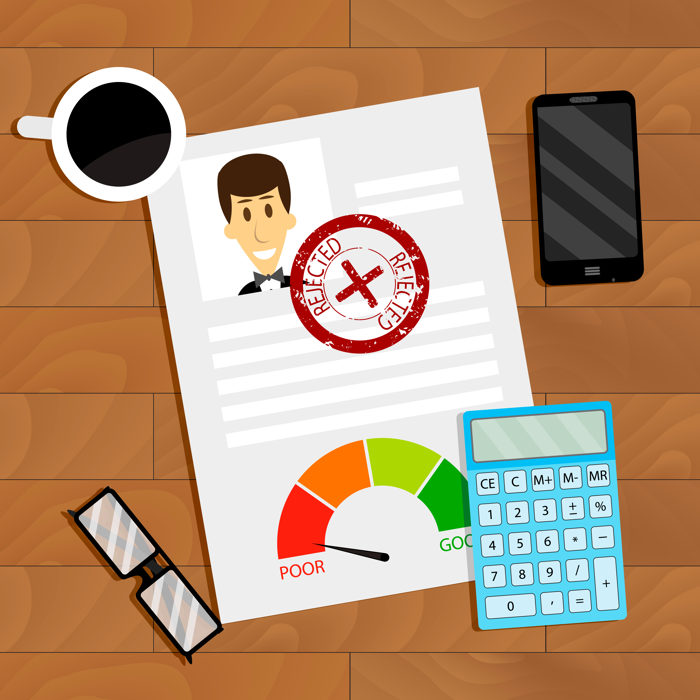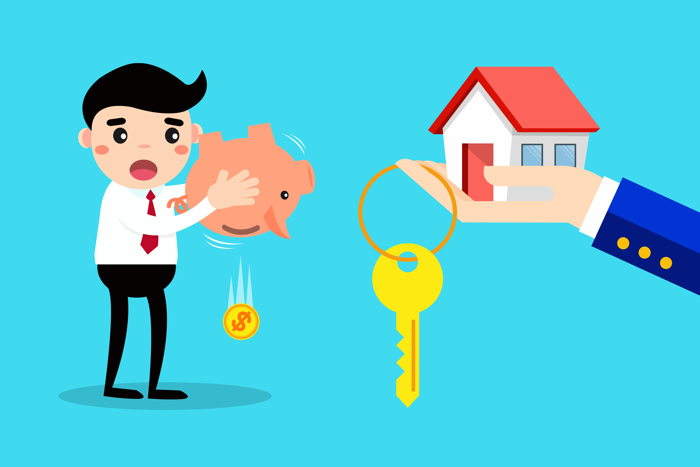
Did you spend so much time on your mortgage application, to then receive the unfortunate news that you have been refused a mortgage? There is a long list of reasons why you may have been refused a mortgage. However, the key to overcoming the fact that your mortgage application was declined is to realise why it has occurred. This post explores some of the main reasons for being refused a mortgage.
1 in 4 applicants are refused a mortgage so if you’re experiencing this, you definitely aren’t the first or the last, as the UK has been experiencing some difficulties in regard to housing in recent years. The following are reasons for being refused a mortgage that you should be aware of, so that your next mortgage application is more successful.
Your mortgage lenders will assess your mortgage application based on many different factors, one being your credit rating. It is very likely that you will receive back a declined mortgage application if your credit score is poor and you are already in a lot of debt. This is because it will demonstrate to lenders that you are not efficient in paying back your loans and will show that you have other debts to focus on apart from the mortgage. Therefore, lenders will doubt your ability to pay back a mortgage and you will be refused a mortgage. Here are some tips to eliminate bad credit.

(Copyright: Ivelin Radkov/shutterstock.com)
Have you been refused a mortgage solely on the basis that you have a non-existent credit history? You may think that this is a good thing as you do not owe any third-parties any money. However, this does not give mortgage lenders an idea of what your paying-back abilities are like. Ways to build your credit score include getting yourself a secured credit card or setting up some direct debits to show that you can pay utility bills or a gym membership on-time each month. Growing your credit history will take you one step closer to getting a mortgage approved the next time you apply.

(Copyright: Aleutie/shutterstock.com)
Having gaps in your employment can have consequences for your mortgage request and can be the cause of a declined mortgage application. If lenders can’t see evidence of you having been in long-term employment, they may reject your mortgage application. A full and consistent employment history shows lenders that you are likely to have a steady job and are unlikely to be unemployed. Which will in-turn affect your repayments.

(Copyright: fizkes/shutterstock.com)
One of the reasons for a declined mortgage application is that your income may be too low and so lenders may think you aren’t capable of paying back a large loan that isn’t easily repayable with your current financial situation. This type mortgage refusal is also known as ‘mortgage declined on affordability’.
So, what should you do if you have your mortgage declined on affordability? In this case you should ask for a smaller mortgage or apply for the government funded Help-to-Buy scheme. If you’re looking to buy a house on a low income, here are 4 helpful tips.

(Copyright: Sai Tha/shutterstock.com)
Being refused a mortgage is likely if you have recently become self-employed. This is due to the fact that, again, you don’t have much evidence of a steady income yet, and lenders will question whether you will be able to pay back your mortgage on a newly self-employed income, as it depends on just how well you are doing money-wise. One thing you can do after being refused a mortgage due to this, is to reapply once you have some reliable and consistent evidence of your income from your self-employment or postpone your self-employment until you have secured your mortgage and started repaying it back easily. If you do not pay your mortgage in time and are struggling financially, you could be at risk of repossession.

(Copyright: Aysezgicmeli/shutterstock.com
Another reason why mortgage applications get rejected is due to not being on the electoral roll. This is due to the simple fact that mortgage lenders collect information about you from the electoral register in order to check your identity, and if your name and details aren’t on the list, they will not be able to confirm who you are. Register yourself onto the electoral roll to avoid being refused a mortgage again.

(Copyright: TierneyMJ/shutterstock.com)
If you have not been a resident of the EU or UK for 3 or more years, you may have been refused a mortgage as that is a legal requirement in order to be eligible to get a mortgage. For non-EU nationals, you must have lived in the EU for at least 2 years, have a permanent job in the UK and residence rights or a UK work permit as well as a UK bank account. These years spent in the UK are a requirement for getting a mortgage because it allows you time to build your credit history.

(Copyright: Soz Risso/shutterstock.com)
These are the most common reasons for being refused a mortgage but don’t lose hope as there are many ways in which you can prevent this, just make sure you tick all the boxes before you reapply. If you are in need of other housing support and advice, FastHomes are here to help.
(Feature Image Copyright: 09910190/shutterstock.com)
